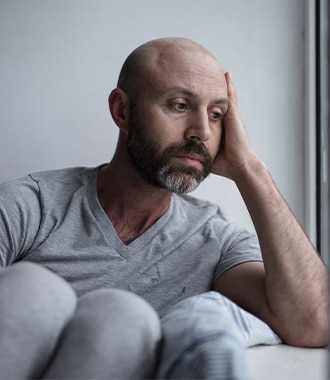Wellness
How to manage depression
By Kristi Leksen, MA, Licensed mental health counselor Nov 26, 2024 • 8 min
Depression is one of the most common mental health conditions in the United States, but it’s also one of the most treatable mental health issues. In fact, 70% to 90% of people with depression eventually respond to treatment.
Some ways to help manage depression include:
1. Psychotherapy: Many people with depression can benefit from psychotherapy with a licensed mental health professional. Sometimes called talk therapy, it involves discussing your feelings and thoughts, gaining an understanding of why you think and feel the way you do, and developing coping strategies that can help you better manage your depression symptoms.
There are many types of psychotherapy available, but two types are particularly common for depression treatment: Cognitive Behavioral Therapy (CBT) and Interpersonal Therapy (IPT). A goal-oriented, usually short-term therapy, CBT focuses on identifying problematic thoughts and behaviors and devising solutions for overcoming them. IPT is relationship-centered and examines how people around you affect your mood and how your emotional state impacts others as well.
How long you may need to attend psychotherapy sessions depends on the severity of your symptoms, the type of therapy you choose and other factors. Some people may only need to visit a mental health professional occasionally, while others benefit from ongoing and regular support.
2. Physical activity: Regular exercise is often a vital aspect of depression management. During physical activity, your body releases chemicals called endorphins that have been shown to improve mood. In addition, exercise can provide a beneficial distraction from troubling thoughts and feelings while also helping you gain confidence and self-esteem.
If you experience fatigue due to depression, you can start slowly with your exercise routine. Set small goals, like moving continuously for 5 to 10 minutes at first. Try focusing on gentle activities, such as stretching, yoga, taking a short walk, doing a couple of laps in a pool, lifting small weights or riding your bike to the store instead of driving. As you gain endurance and your energy level improves, you may gradually increase the length of your exercise sessions, aiming for 150 minutes of moderate-intensity exercise per week if you can.
3. Healthy lifestyle changes and self-care: Depression often impacts self-esteem, causing feelings of worthlessness. Practicing self-care may counteract some of the negative self-talk that you engage in due to depression. Some areas to focus on when creating a self-care plan include:
- Eating a well-balanced diet that consists of lean proteins, fruits, vegetables, whole grains and healthy fats
- Limiting heavily processed foods and added sugars
- Keeping up with your personal hygiene by showering, brushing your teeth and grooming
- Getting enough restful sleep at night
- Quitting tobacco usage
- Avoiding self-medicating with recreational drugs
- Reducing your alcohol intake or quitting drinking
Remember that you don’t have to change everything about your lifestyle at once. Pick one item to focus on, set a goal, and celebrate your progress. Then, select another focus area and repeat the process. Each small change can be transformative to your health and well-being.
4. Social support: Depression may cause you to withdraw from people and stop engaging in activities you once enjoyed. The increased isolation that results may worsen feelings of loneliness and hopelessness. As you start managing your depression, try to connect or reconnect with people in your life who are compassionate and supportive.
You may start with small steps by connecting with one trusted friend or family member, and then slowly expanding your circle. You may also want to build new connections by attending a local or online support group, getting involved with a volunteer organization, playing a team sport or joining a club or organization related to one of your hobbies or interests. Contributing to a cause or purpose you care about may also energize and inspire you.
5. Medications: Your healthcare provider may also recommend that you take medication to help manage symptoms. Some antidepressant medications include:
- Selective serotonin reuptake inhibitors (SSRIs): Drugs like citalopram (Celexa), escitalopram (Lexapro), fluoxetine (Prozac), paroxetine (Paxil, Pexeva), sertraline (Zoloft) and vilazodone (Viibryd) are often the first antidepressants that healthcare providers prescribe. These medications work by limiting how much of the brain chemical serotonin your brain reabsorbs.
- Serotonin-norepinephrine reuptake inhibitors (SNRIs): Medications like desvenlafaxine (Khedezla, Pristiq), duloxetine (Cymbalta, Drizalma, Irenka), levomilnacipran (Fetzima), milnacipran (Savella) and venlafaxine (Effexor) treat depression by limiting the reabsorption of serotonin and a second brain chemical called norepinephrine.
- Atypical antidepressants: Drugs in this category treat depression with various methods of action and include bupropion (Wellbutrin XL, Wellbutrin SR, Aplenzin, Forfivo XL), mirtazapine (Remeron), nefazodone, trazodone and vortioxetine (Trintellix).
- Tricyclic antidepressants (TCAs): When other drugs fail to relieve symptoms, healthcare providers may prescribe TCAs, such as amoxapine (Asendin), desipramine (Norpramin), doxepin (Silenor, Sinequan), imipramine (Tofranil), nortriptyline (Aventyl, Pamelor), protriptyline (Vivactil), amitriptyline (Elavil, Vanatrip), and trimipramine (Surmontil). These first-generation antidepressants increase serotonin and norepinephrine levels.
- Monoamine oxidase inhibitors (MAOIs): Usually prescribed only when other drugs prove ineffective, MAOIs work by blocking an enzyme that breaks down brain chemicals. Drugs in this class include isocarboxazid (Marplan), phenelzine (Nardil), selegiline (Emsam) and tranylcypromine (Parnate).
Which antidepressant is right for you depends on the severity of your symptoms, overall health and other factors. In some cases, your healthcare provider may prescribe two antidepressants or an antidepressant plus a second medication to treat other mental health conditions, such as anxiety.
6. Other treatments: If you don’t respond well to antidepressants or you’re unable to take them due to a health condition or side effects, your healthcare provider may recommend electrical stimulation therapies, such as electroconvulsive therapy (ECT), transcranial magnetic stimulation (TMS) or vagus nerve stimulation (VNS). These therapies involve using a mild electrical current to stimulate nerve cells.
Biofeedback is another potential treatment for depression. During a biofeedback session, a practitioner attaches sensors to track your breathing, heart rate and other vital signs and then stimulates your senses through images, sounds, vibrations and other stimuli. By analyzing how you respond to stimulation, the practitioner will then recommend ways for you to manipulate your body to ease depression symptoms.
A management plan for depression can include a wide range of lifestyle changes, therapies and interventions. The first step toward finding solutions that help ease your symptoms is to discuss depression treatment with your healthcare provider.
Updated November 2024.
Sources:
- https://www.nimh.nih.gov/health/topics/depression#part_2257
- https://www.nimh.nih.gov/health/topics/psychotherapies
- https://www.cdc.gov/tobacco/campaign/tips/diseases/depression-anxiety.html
- https://www.womenshealth.gov/mental-health/mental-health-conditions/depression
- https://www.apa.org/topics/depression
- https://www.psychiatry.org/patients-families/depression/what-is-depression
- https://www.mayoclinic.org/diseases-conditions/depression/diagnosis-treatment/drc-20356013
- https://www.mayoclinic.org/diseases-conditions/depression/in-depth/depression-and-exercise/art-20046495
- https://my.clevelandclinic.org/health/treatments/9301-antidepressants-depression-medication
- https://my.clevelandclinic.org/health/treatments/24795-ssri
- https://my.clevelandclinic.org/health/treatments/24797-snri
- https://my.clevelandclinic.org/health/treatments/25146-tricyclic-antidepressants
- https://my.clevelandclinic.org/health/diseases/9290-depression
- https://my.clevelandclinic.org/health/treatments/21208-cognitive-behavioral-therapy-cbt
- https://my.clevelandclinic.org/health/treatments/interpersonal-psychotherapy-ipt
- https://www.psychiatry.org/patients-families/lifestyle-to-support-mental-health
- https://www.nami.org/complimentary-health-approaches/hygiene-indifference-the-symptom-we-dont-talk-about/
- https://www.ncbi.nlm.nih.gov/books/NBK557395/
- https://my.clevelandclinic.org/health/treatments/13354-biofeedback



